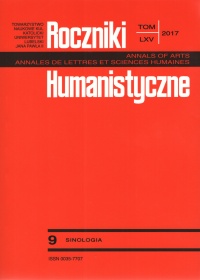Development Assistance and Economic Cooperation of the People’s Republic of China with Afghanistan
Abstract
The aim of the article is to present and assess the development assistance provided by the Government of the People’s Republic of China to Afghanistan and the economic cooperation between these states. It presents the motives, circumstances and prospects of these activities. This article has two main theses. Firstly, the development assistance provided by the PRC Government to Afghanistan is very limited. This is mainly due to the fact that the Beijing authorities do not want to support the actions of the United States-led international coalition in Afghanistan. Secondly, also the economic cooperation between states is limited, which is primarily a consequence of the fragile security situation in the country. Derogations from this rule are relatively high investments of Chinese companies in the Afghan mining sector.
References
Ali, Mahmud. „Peripheral South Asian response to the growth of Chinese power: a study in dichotomous continuity”. W: Mingjiang Li i Kalyan M. Kemburi, eds. China’s Power and Asian Security, 111–138. London, New York: Routledge, 2015.
Arduino, Alessandro. „China’s Energy Interests in Central Asia and Russia: Symbiotic distrust and striking a balance between cooperation and confrontation”. W: Fengshi Wu i Hongzhou Zhang, eds. China’s Global Quest for Resources: Energy, Food and Water, 119–137. London, New York: Routledge, 2017.
Central Statistics Organization of Islamic Republic of Afghanistan. Statistical Yearbook 2016-2017. Trade. Dostęp 27.10.1017. http://cso.gov.af/en/page/1500/4722/2016-17.
Cordesman, Anthony, i Ashley Hess. „Transition in the Afghanistan-Pakistan War and the uncertain role of the great powers”. W: Joachim Krause i Charles King Mallory, eds. Afghanistan, Pakistan and Strategic Change. Adjusting Western regional policy, 70–148. London, New York: Routledge, 2014.
Crane, Keith, i Victoria Greenfield. „The NATO drawdown: implications for Afghanistan and Pakistan”. W: Joachim Krause i Charles King Mallory, IV, eds. Afghanistan, Pakistan and Strategic Change. Adjusting Western regional policy, 269–289. London, New York: Routledge, 2014.
Curtis, Lisa. „China’s South Asia Strategy”. The Heritage Foundation. Testimony Asia. 17 March 2016. Dostęp 14.07.2017. http://www.heritage.org/testimony/chinas-south-asia-strategy.
Downs, Erica. „China Buys into Afghanistan”. SAIS Review 32 (2012), No. 2: 65–84.
ENGLISH.GOV.CN. The People’s Republic of China. The State Council. „A Joint Statement between the People’s Republic of China and the Islamic Republic of Afghanistan”. Beijing: 20 June 2006. Dostęp 10.07.2017. http://www.gov.cn/misc/2006-06/20/content_315724.htm.
Gacek, Łukasz. Azja Centralna w polityce energetycznej Chin. Kraków: Wydawnictwo Uniwersytetu Jagiellońskiego, 2013.
Gajda, Jakub. „Zaangażowanie Chin w Afganistanie — stan obecny i perspektywy”. Biuletyn Opinie FAE 2015, nr 4: 1–9.
Gartenstein-Ross, Daveed, Daniel Trombly i Nathaniel Barr. Chinas Post-2014 Role in Afghanistan. Washington: Foundation for Defense of Democracies, October 2014.
Głogowski, Aleksander. „Chiny – Pakistan – Afganistan. Nowe mocarstwo wobec starych wyzwań”. W: Robert Kłosowicz, Bogdan Szlachta, Janusz Józef Węc, red. Dylematy strategiczne XXI wieku. Księga Jubileuszowa dedykowana Profesorowi Michałowi Chorośnickiemu z okazji czterdziestolecia pracy naukowej, 263–272. Kraków: Księgarnia Akademicka, 2013.
Harpviken, Kristian Berg. „A peace nation in the war on terror: the Norwegian engagement in Afghanistan. W: Nik Hynek i Péter Marton, eds. Statebuilding in Afghanistan. Multinational contributions to reconstruction, 157–173. London, New York: Routledge, 2012.
Harsehé, Rajen. „Situating Afghanistan in a globalizing world”. W: Rajen Harsehé i Dhananjay Tripathi, eds. Afghanistan Post-2014. Power configurations and evolving trajectories, 17–32. New Delhi, London, New York: Routledge, 2016.
Hausheng, Zhao. China and Afghanistan. China’s Interests, Stances, and Perspectives. A Report of the CSIS Russia and Eurasia Program. Washington: Center for Strategic & International Studies, March 2012.
International Copper Study Group. The World Copper Factbook 2016. Dostęp 10.07.2017. http://www.icsg.org/ index.php/component/jdownloads/finish/170/2202.
International Trade Centre (ITC), Geneva. Dostęp 10.07.2017. „Bilateral trade between Afghanistan and China”. http://www.trademap.org/tradestat/Bilateral_TS.aspx?nvpm=1|004||156||TOTAL||| 2|1|1|1|2|1|1|1|1.
International Trade Centre (ITC), Geneva. Dostęp 10.07.2017. „Bilateral trade between China and Afghanistan”. http://www.trademap.org/tradestat/Bilateral_TS.aspx?nvpm=1|156||004||TOTAL||| 2|1|1|1|2|1|1|1|1.
Lanteigne, Marc. Chinese Foreign Policy. An Introduction. Third Edition. London, New York: Routledge, 2016.
Levi-Sanchez, Suzanne, The Afghan-Central Asia Borderland. The state and local leaders. London, New York: Routledge, 2017.
Ministry of Foreign Affairs. Islamic Republic of Afghanistan. „China-Afghanistan Joint Statement on Deepening Strategic and Cooperative Partnership”. Beijing: 7 November 2014. Dostęp 10.07.2017. http://mfa.gov.af/en/news/china-afghanistan-joint-statement-on-deepening-strategic-and-cooperative-partnership.
Opacin, Nerkez. China’s Role in Afghanistan. A Capitalist Peace Approach. Hamburg: Anchor Academic Publishing, 2015.
Pantucci, Raffaello. „Commentary: China’s expanding security role in Afghanistan”. Reuters, 1 March 2017. Dostęp 06.07.2017. http://www.reuters.com/article/china-afghanistan-securityrole-idUSKBN1683QY.
Pantucci, Raffaello, i Alexandros Petersen. „China Digs in to Afghanistan”. The National Interest. 24 May 2012. Dostęp 06.07.2017. http://nationalinterest.org/commentary/china-digs-afghanistan-6961? page=2.
Roberts, Guy C. US Foreign Policy and China. Bush’s first term. London, New York: Routledge, 2015.
SIGAR. Special Inspector General for Afghanistan Reconstruction. „Quarterly Report to the United States Congress”. 30 January 2015. Dostęp 14.07.2017. http://reliefweb.int/sites/reliefweb.int/ files/resources/ 2015-01-30qr.pdf.
Szczudlik-Tatar, Justyna. „Towards More Rebust Diplomacy with ‘Chinese Characteristics’”. PISM Strategic File 2014, No. 22 (58): 1–6.
Wywiad autora z Marcinem Krzyżanowskim, byłym konsulem RP w Kabulu, Prezesem Zarządu Ariana Trade Group sp. z o.o.
Zaborowski, Wojciech. „Polityka Chin wobec Afganistanu w kontekście zakończenia misji ISAF”. Bezpieczeństwo Narodowe 2012, nr III-IV (23–24): 141–164.
Zafar, Athar, Dinoj K. Upadhyay. „Drawdown from Afghanistan: implications for India’s engagement in Central Asia”. W: Rajen Harsehé i Dhananjay Tripathi, eds. Afghanistan Post-2014. Power configurations and evolving trajectories, 231–244. New Delhi, London, New York: Routledge, 2016.
Copyright (c) 2017 Roczniki Humanistyczne

This work is licensed under a Creative Commons Attribution-NonCommercial-NoDerivatives 4.0 International License.





